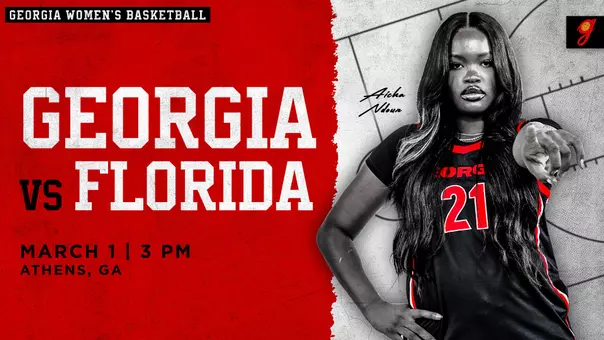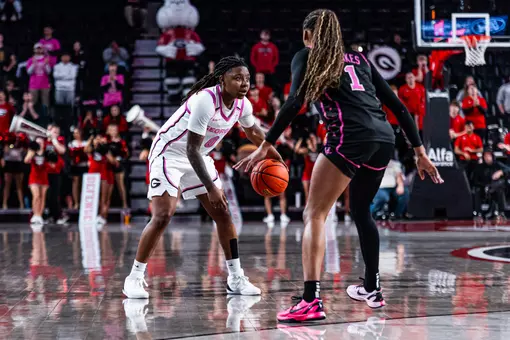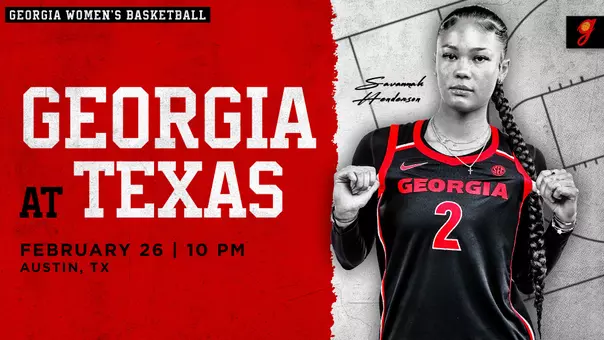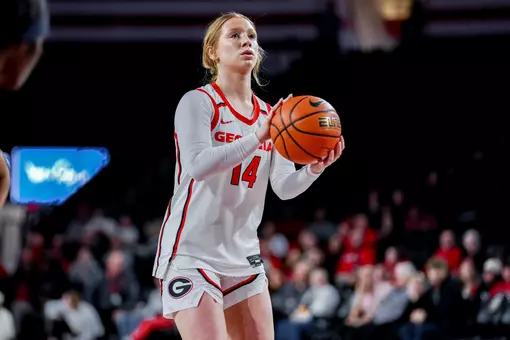University of Georgia Athletics
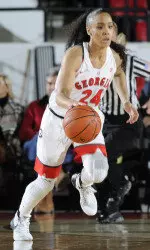
A Quick Chat With ... Marjorie Butler
December 31, 2015 | Women's Basketball
By John Frierson
UGAAA Staff Writer
Marjorie Butler has recently completed her degree in Exercise Science and in the spring the senior Georgia women's basketball point guard will wrap up a second degree, in Biology No, she's not messing around in the classroom.
The Knoxville, Tenn., native is headed to medical school after she finishes up at Georgia. If you spent five minutes with her, and got to see up close her smarts and poise and thoughtfulness, you'd come away thinking she's going to do a lot of people a lot of good one day.
Butler, who has started all 13 games this season and has 60 assists to just 15 turnovers heading into Sunday's Southeastern Conference opener at Texas A&M, sat down for a quick chat Wednesday. She talked about wanting to be a doctor, suddenly finding herself with some free time, what she learned from playing youth football and much more.
Here's some of what she had to say:
Frierson: Who were the first players that you really looked up to when you were young?
Butler: Being in Knoxville, Tenn., women's basketball is a very large part of the culture there, so I grew up watching players like (Lady Vols legend) Kara Lawson, and a lot of people told me I looked like her growing up. And I heard she played football when she was young, too, just like I did.
Automatically she was somebody I looked up to as a point guard. And I enjoyed watching her play and following her now in her professional career.
Frierson: What did playing youth football instill in you that you've carried with you all these years?
Butler: A couple of things, I think. One of the main things is just the leadership abilities. I played quarterback growing up and that's naturally a position where you're directing and leading people on the field, and playing point guard is extremely similar to that.
I think it also instilled a toughness in me and a mentality that I could do whatever I wanted to, as long as I put my mind to it. That physicality of football is something that I sometimes try to include in my basketball game, as well.
Frierson: Well, the game has gone in that direction, where you can't be shy about contact at either end of the floor
Butler: It's definitely part of it and it's something that, especially in the Southeastern Conference with the athletes that we have, it's one of the most physical conferences in the country. That's one of the reasons that I wanted to play here, you have athletes and it's physical and tough. That's something that I enjoy, as well, being in a physical conference.
Frierson: We're heading toward the end of 2015, so what are a couple of things that you're very thankful you've learned or discovered this year? They can be bands, books, a new sandwich, a life lesson or whatever.
Butler: I think something that I'm now appreciative of, now that I've made it through, is sort of the struggles that I've gone through academically while preparing for medical school and my MCAT. It's something that started last December for me and continued throughout the school year and throughout conference play.
I was going to classes from 8 to 11 at night and it was difficult. I was getting up at 5 o'clock in the morning, studying 30-40 hours a week and it was hard. It was very difficult and there were times when I just wanted to give up, and right about now it's all paying off. That's a great feeling, knowing you're hard work is paying off; but more so than that I'm appreciative that it made me see what I'm able to do.
I think that's something that's neat about your struggles, it makes you stronger, it makes you a better person — you never really realize what you're capable of doing until that's the only choice that you have. I think that everything that I've been through trying to get ready for medical school has made me a better person on and off the court and I'm grateful for that.
Frierson: What type of medicine do you want to practice?
Butler: Naturally I've fallen into the field of orthopedics because of my multiple knee surgeries. I did all of my shadowing with orthopedic surgeons, but I'm really open to any field of medicine right about now.
I definitely enjoyed my shadowing experiences with orthopedics, but I also know that there's a lot of fields that I haven't seen yet.
Frierson: Over the years I've interview quite a few athletes, mostly basketball players actually, that have gone through the big knee injuries and came out of them wanting to be orthopedic surgeons. I think they all had such positive experiences with their doctors that it drove them to want to be like them.
Butler: The craziest thing for me is that I actually shadowed the orthopedic surgeon that performed my ACL surgery (in high school). I was a sophomore in college and one of the first surgeries that I watched him perform was an ACL reconstruction on another athlete.
To me that was just a surreal moment, and very inspirational, because in that moment I was watching him perform a surgery that he performed on me. I knew the impact that it had on me and me continuing to pursue my goals as a collegiate athlete, and I knew it what type of impact it could potentially have on that person.
Frierson: What's it like watching a surgery?
Butler: It's weird. At first I didn't know what I was looking at. As I said, the first time I did any shadowing I was a sophomore, and the more you watch it, you figure out what's going on and you figure out the landmarks and what you're looking at through the surgery.
It's neat because you can see them actually perform the surgery and then you see them up at the screen and they're talking you through the surgery. To me, that's just something that's interesting to me — understanding the body and how it works. Even at the cellular level and understanding how cells interact, it's just something that is interesting to me.
I have a desire to impact the community and help better someone's life. And if I can do that through medicine, which is something that interesting to me, I just feel like that's a powerful combination.
Frierson: In the quiet moments of your day, which I know have been few and far between, how do you spend your time?
Butler: This has been the quietest my life has been, this winter break, in a couple of years. I was talking to my parents about it — in the last two years I haven't had free time. This time last year I was actually studying for my MCAT during winter break and then in the summer I was preparing for my MCAT and doing shadowing, and it was just non-stop.
Now I have some time on my hands, in the last week or so, and it feels great, but it's weird because I haven't had that in so long.
Frierson: How are you filling that time?
Butler: A lot of Netflix and a lot of Hulu. I'm spending time with my teammates, too, which is something that I've missed out on a lot, especially in the last year. There would be times when they were going out to a movie or something and I had to be like, I've got to study, guys. It kind of stinks because I'm the bump on the long sometimes, but my teammates have supported me throughout everything.
Now I get to spend more time with them and I get to spend more time with myself, too, which is great.
John Frierson is the staff writer for the UGA Athletic Association and curator of the ITA Men's Tennis Hall of Fame. You can find his work at: Frierson Files. He's also on Twitter: @FriersonFiles and @ITAHallofFame.

